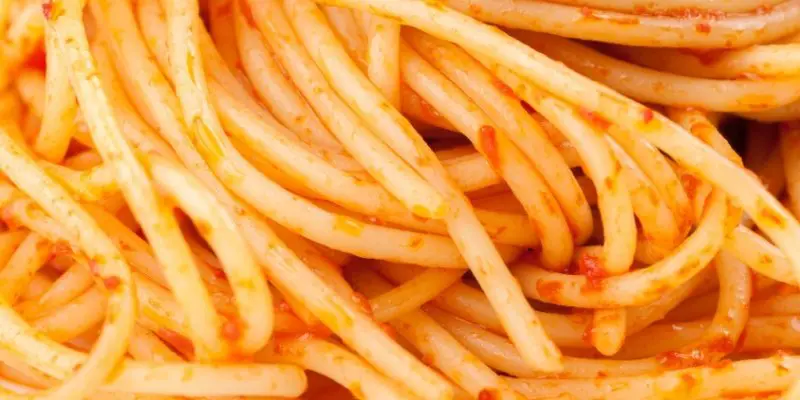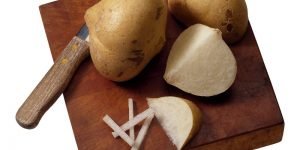Spaghetti squash or vegetable spaghetti can be made in various forms, dimensions, and colors including ivory, yellow and orange, known for highest carotene amount. It’s generally a low-calorie food, high in fibers and nutrients and low in everything else.
One hundred grams of Spaghetti squash contains on average 31 calories, 0,6 g of fats, 0 mg of cholesterol, 17 mg of sodium, 7 g of carbs with 1.5 g of fiber along with vitamins C, D, A, B6, calcium, magnesium, etc. Sounds good, right?
So, can dogs have spaghetti squash?
The answer is yes; dogs may eat spaghetti squash and other types of squash such as pumpkins, acorns, and courgettes that are considered to be non-toxic to your pet as established by The American Society for the Prevention of Cruelty to Animals® (ASPCA®). Spaghetti squash provides an excellent backup for rice and pasta if you want to put your pup on a grain-free diet. However, you must be mindful of several things before feeding this stringy fruit to your canine.
Four benefits of spaghetti squash for dogs
Spaghetti squash isn’t some human snack; it offers your pet multiple health benefits.
These are as follows:
- Its sticky quality characterizes easy digestion. It contains lots of good fiber that is extremely important to your dog. Fiber reduces indigestion. If your dog has issues with bowel movement or constipation, think of serving him or her spaghetti squash. It can work brilliantly for a pet’s digestive system.
- Spaghetti squash contains a lot of essential minerals. For example, it includes a lot of magnesium and potassium, both of which are extremely important to the normal functioning of the body. It is also rich in copper that helps absorb iron. There is also plenty of folates, another vital nutrient.
- Rich in beta carotene Just like other representatives of the squash family, squash spaghetti is loaded with beta carotene which is generally transformed to vitamin A. This is an important mineral for your dog’s eyes healthy. It has also been proven to help young pups to grow safely. Beta carotene also helps reduce the harmful effects of age in older canines, particularly in stopping eye loss.
- Spaghetti squash is also rich in antioxidants that are important to enhance the immunity of your canine. That makes the pup more resilient to infections and illnesses and can substantially reduce the number of your trips to the vet.
Spaghetti squash and dogs. Potential downsides
You will need to consider taking a few steps to ensure the new addition to his diet is as healthy as possible while still packed in many nutrients.
First, you would like to whip out the squash— the lumpy noodles within — and feed your dog with it. Take away the dense, hard rind from the flesh. It is advisable that dogs do not eat the chunky peel of winter squashes, like spaghetti or corn squash. Thin skins of summer squashes are considered better for your pup.
We do not advise you to serve your canine entire raw squash here also. it won’t be poisonous for him, but it can be dangerous still. His body might have significant difficulties absorbing it, and he might choke on it given how big the pieces are.
If untreated, an obstruction in the intestine with larger chunks of the rind may threaten a dog’s life and may require operations to be removed. If those accidentally was consumed by your dog, look for signs of intestinal impairment that include failure to bowel or vomit, as well as shifts in the behavior, such as fatigue or refusal to eat.
Supervise the pup carefully for symptoms of gut blockage and ensure that it regularly bowels. If he or she shows any of these signs, immediately seek emergency veterinary assistance.
Another preventative measure you would like to take is to take away the seeds of spaghetti squash. Fruit and veggie seeds may be toxic to dogs and must be avoided. They may also cause an intestinal blockage as well.
How to make spaghetti squash dog-friendly?
If you plan to serve your squash, then it is a good idea to feed him with cooked version instead of a raw. Raw squash can be rough on the digestion of a dog because their teeth mine won’t chew this dish too well.
As a consequence, they will just swallow it as it is and it may cause stomach discomfort, vomiting, or diarrhea. It is, therefore, best to cook it before you give it to your canine.
If you still want to give your dog raw squash for any purpose, make sure you cut it into smaller chunks first.
You might also like:
Can Dogs Eat Nectarines: Fresh, Canned, with Skin or Not?
High-Calorie Dog Food: Best Possible Options to Help Your Pet Gain Weight
Can Dogs Eat Grapefruit? Here’s What the Vet Thinks
Can Dogs Eat Banana Chips?
Can Dogs Eat Jicama?
We like to add butter, pepper, garlic, and other seasonings if making spaghetti squash for ourselves. It is crucial not to add these condiments to the cooked squash of your pup. Cook the plain version for him his bland, and he will always enjoy it. It will be better for his digestion, and he will not be subjected to additional toxins, such as salt, which could hurt his health.
You may blend the cooked squash with the normal diet of your pup’s wet or dry dog food to spice his feast up. You can also give it as a special snack, but he most likely will enjoy it better as a part of his regular meal.
Don’t forget to cut dog’s squash spaghetti into smaller pieces, because he can not chew it himself properly. That not only helps him avoid chokes but also helps to metabolize the dish.
Spaghetti squash may cause your dog’s diarrhea, so it is crucial not to serve it too often. A few scoops or a few spoons of stringy flesh would be enough to start with. Like with anything else in your pet’s diet, moderation is essential.
Spaghetti squash for dogs. Summary
Spaghetti squash provides dogs with various health benefits. It is a great fiber source and may be the right choice for dogs who are constipated because it can aid to soften their stool and return their bowels to normal. But it has to be offered to your pup in moderation.
If your dog eats spaghetti for the first time, offer him a little bit to start by seeing how his body will respond to it. All in all, spaghetti squash can be a healthy and delicious seasonal treat, if cooked properly and served in small portions.
Whatever you decide, remember, that it always makes send to check out with your vet before you introduce any new food into your dog’s diet.
Credits: thanks for the cover photo to Canva.







